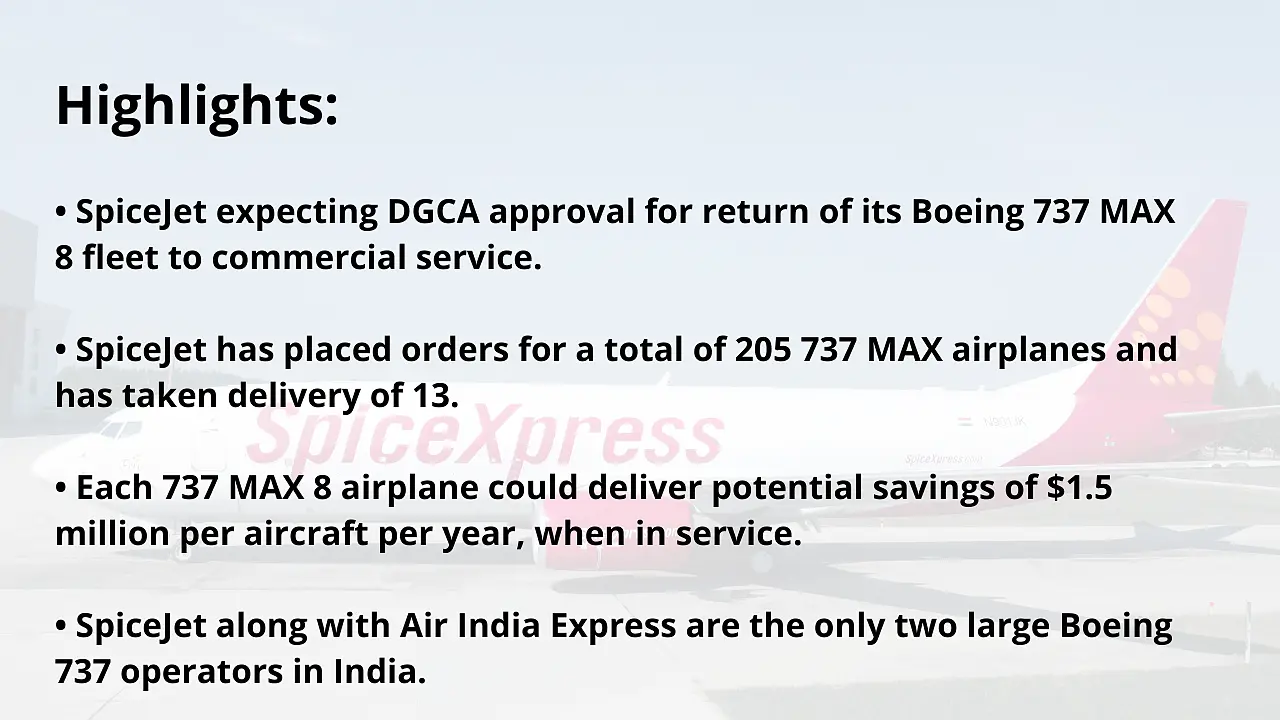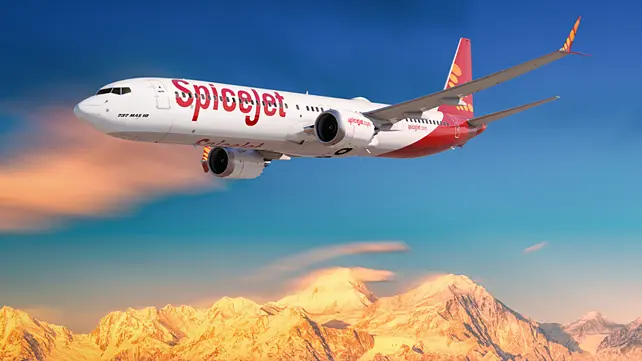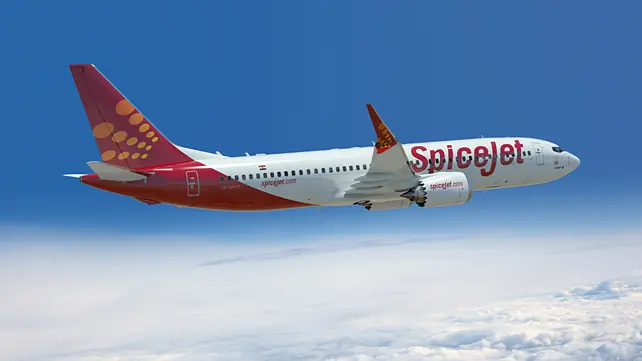
SpiceJet’s long wait to resume commercial services with its fleet of Boeing 737 MAX 8 single-aisle jetliners, is expected to end next month, when it receives regulatory approval from the Directorate General Civil Aviation (DGCA).
The grounding of SpiceJet’s newest and most fuel-efficient airplanes since March 2019 and the disruption of the global aviation industry due to the COVID-19 pandemic dealt a double blow to SpiceJet. SpiceJet is presently operating with a fleet of 55 Boeing 737 New Generation (NG) jetliners and 32 De Havilland Canada Q400 turboprop regional transport aircraft.
It is presently the only Indian MAX operator and its aircraft were grounded by the DGCA in March 2019, following two fatal MAX 8 crashes involving Lion Air flight 610 and Ethiopian Airlines flight 302 that resulted in 346 deaths.

Return to efficiency
The return of SpiceJet’s 737 MAX aircraft into commercial service will allow it to benefit from the aircraft’s double-digit improvements in fuel efficiency along with lower operating costs. SpiceJet was originally to have saved $1.5 million per plane a year with every 737 MAX 8 in service. A full fleet of up to 205 MAX airplanes would have delivered fuel savings of up to 240,000 metric tonne per year for SpiceJet, translating into more than $317 million in annual cost savings, in addition to emitting up to 750,000 fewer metric tons of CO2 [1].
737 MAX aircraft can also fly farther and stay in the air for an hour longer than SpiceJet’s existing 737-800 NG aircraft. SpiceJet announced this week, that it anticipates grant of regulatory approval to restart commercial service with its MAX aircraft by the end of September.
Ajay Singh, Chairman and Managing Director, SpiceJet, said, “I am delighted to share that our 737 MAXs will be back in the air soon. As India emerges from COVID and air traffic picks up again, the MAX aircraft will play a major role in our future expansion. With a better and a more efficient fleet back in operation we expect a significant reduction in our operating costs improving our bottom line.”
Timely settlement
SpiceJet has also reached a settlement agreement with aircraft lessor Avolon from whom it has leased its MAX aircraft. Avolon is a major lessor of MAX aircraft with 50 on order and has also leased aircraft to Vistara, delivering its eighth aircraft (an Airbus A320neo) in June.

The grounding of SpiceJet’s 737 MAX fleet since March 2019 has meant that they could not be used for revenue operations but also continued to incur other costs involved in their upkeep and maintenance.
SpiceJet initiated compensation claims against Boeing following the grounding of its MAX fleet and continues to receive compensation from the airframer. The airline is also facing a claim for approximately INR 320 crore related to contractual issues on undelivered aircraft from De Havilland Canada. SpiceJet uses 78- and 90-seater Q400s on regional routes.
Prior to being grounded, the 737 MAX was the fastest-selling airplane in Boeing history. Boeing has had to compensate several carriers for damages incurred due to the flight ban imposed on MAX jetliners and has also seen deliveries dry up, with many customers choosing to defer their aircraft deliveries. Boeing removed more than 1,000 MAX jetliners from its order backlog in 2020 alone.
Preferred customer
Boeing’s 737 jetliners have been the backbone of SpiceJet’s fleet since it started operations in May 2005 with two 737-800 NG aircraft, preferring the Boeing aircraft for its high reliability, low operating economics and comfort. SpiceJet remains vital to Boeing’s plans for the Indian market and along with Air India Express (24 737NGs) are the only two large 737 operators in India, following the collapse of Jet Airways. On the other hand, the Airbus A320neo family is in service with IndiGo, Air India, Vistara, Go First and Air Asia India.
SpiceJet today has a fleet of approximately 100 aircraft comprising of 55 737NGs, 32 Q400s and 13 737 MAX 8s. It received its first MAX 8 aircraft in October 2018 and went on to place orders for 205 aircraft. These included firm orders for 155 MAX 8, 9 and 10 airplanes, as well as purchase rights for 50 additional aircraft.

SpiceJet’s cargo division, SpiceXpress added its first 737-800 Boeing Converted Freighter (BCF) in 2019 and now has a fleet of four of the type. The standard-body freighter was the first 737-800BCF to be operated in South Asia. As compared to older standard-body freighters, the 737-800BCF offers a lower operating cost per payload tonne and can carry payloads of up to 52,800 pounds (23.9 metric tonne).
Other major operators of Boeing aircraft in India include Vistara, which has six 787- 9 Dreamliners on order with purchase rights for four more and has six 737NGs in service. India’s largest express cargo operator, Blue Dart operates six 757 Freighters. Four 737-200s and three 737 Boeing Business Jets are operated by the Ministry of Defence along with two 777-300ERs used as Head of State aircraft and operated by Air India.
Reference:
[1] Based on: General rules, 750-nmi mission, two-class seating, fuel price: $4.00 per U.S. gallon, 737 MAX 8. Boeing figures.